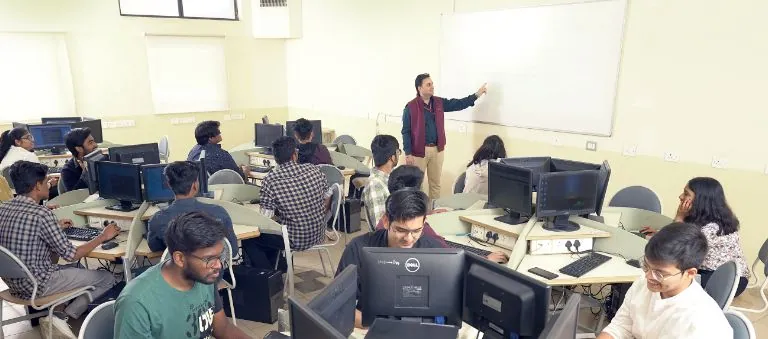BTech Cyber Security
An advanced Cyber Security course to put you on a high-growth career path.
NU has been offering the Cyber Security course as a specialisation area in its undergraduate programme since 2014. Our alumni are performing key roles in industry and academia. NU also offers industry-sponsored MTech Cyber Security programmes. Shikhil Sharma and Ananda Krishna, both alumni of NU’s Cyber Security programme have founded Czar Securities, one of the hottest startups in India that has also won a prestigious award. The firm operates in the field of cybersecurity.
Read moreThe time is perfect to build a career in Cyber Security. Human society is increasingly becoming dependent on digital technologies. From online transactions to socialising, applying for jobs to exchanging private and confidential information, digital pervades our lives like never before. And every digital touch point generates large swathes of complex data. IoT (Internet of Things) and Industry 4.0 are adding to this volume of complex data with wireless sensors networks generating data by the second.
If digital is the new way of life, data is the invisible currency and hence, vulnerable to attacks. Well-equipped cyber criminals continue to assault corporates, governments and the common man alike through data breaches, data manipulation, and cyber-attacks. Critical infrastructure of nations such as banking, air traffic control, energy distribution, e-governance etc., which are dependent on the Internet for proper functioning, are vulnerable to cyber-attacks. National security, in today’s times, is linked to Cyber Security.
The science of protecting data and networks from threats, manipulation and cyber-attacks forms the core of cyber security. It involves predicting, preventing and mitigating the effects of cyber-attacks. However, there is an increased need of trained professionals with the right set of knowledge, skills and attitudes to tackle the ever-growing menace of cyber-crime. According to the World Economic Forum, the world faces a projected shortfall of 3.5 million cyber security experts today.
NU’s BTech Cyber Security programme aims to bridge the skill gap between the manpower needs and available talent pool. Our Cyber Security course is designed to create skillful industry-ready Cyber Security engineers. The programme architecture has been designed for students who are keen to explore and exploit the latest trends in Cyber Security technologies in undergraduate studies. A combination of deep academic rigour and intense practical approach will allow BTech Cyber Security graduates to obtain in-demand skills and build expertise.
NU’s BTech Cyber Security course is a 4-year undergraduate programme that prepares students to identify and assess cyber threats, and design, configure and implement solutions to secure networks including global, industry-specific and networks critical to the nation such as governance, banking, energy, transportation, etc, using the latest technologies and tools for encryption, firewalls and malware protection.
The course includes topics such as Cryptography, Cloud Security, IoT and Ad hoc Networks Security, AI in Cyber Security and Information Security Risk Management. BTech Cyber Security graduates go on to work in the areas of incident response management, SOC (security operation centre), GRC (Governance, Risk Management and Compliance), Cyber Forensics, etc.
NIIT University introduces flexible industry and research engagement
Industry Practice (IP) has been widely appreciated by NU’s industry partners with a majority of students been given a pre-placement offer (PPO). Industry organisations have also expressed interest in longer duration IP.
Further NEP 2020 (National Education Policy 2020) too actively encourages internships with industry to improve employability of students. It also suggests offering research internship opportunities with faculty researchers in own institution or other institutions and research organisations. This has been reflected in UGC and AICTE policy and guidelines.
With this in mind, NU provides undergraduate students with three curricular architectures, including a revolutionary 1-Year Research Practice in the place of a single fixed architecture. This gives flexibility to students to craft their own industry/research engagement keeping their preference and motivation by choosing any one of the three curricular architectures.
The three curricular architectures are as follows:
- Curricular architecture 1: 6-month Industry Practice in the final eighth semester
- Curricular architecture 2: 1-Year Industry Practice spreading across two semesters in the final year
- Curricular architecture 3: 1-Year Research Practice spreading across two semesters in the final year
BTech Cyber Security – Distinguishing Features
Industry-linked course architecture/curriculum
Industry-academic synergy for real-life immersive learning
Acknowledging the huge demands in cyber security in the industry today, the BTech Cyber Security programme has been designed to create trained Computer Science graduates to fulfill the requirements of the industry. The programme offers an immersive experience. Students of BTech Cyber Security work on two Capstone projects, one R&D project, and engage in a 6-month long Industry Practice.
Students opting for 1-Year Industry Practice or Research Practice will undertake one Capstone project and engage in Industry Practice or Research Practice during the last two semesters.
Top-notch faculty
State-of-the-art infrastructure
Unique teaching methodology
Several unique teaching methods are integrated into the project-based learning approach at NU. This approach helps students to develop independent learning skills and builds a deeper understanding of subjects.
BTech Cyber Security – Industry Practice Partners
Here are some of our distinguished industry partners for the BTech Cyber Security programme.
Student testimonials

Sourish Das
NU alum; currently works at IBM India Pvt. Ltd.
"NU’s industry-linked, advanced Cyber Security curriculum provided me with the opportunity to enter the thrilling world of Cybersecurity. At my current organisation that focuses on continuous learning, I chose to conduct research on gRPC Pentesting and Security. It is a new technology and very few companies have adopted it. I worked with my team under the guidance of senior mentors and discovered some key vulnerabilities in the technology. We also represented the research at international conferences. I am glad that this added a lot of value to my current organisation. NU taught me to remain curious and explore the new and the unknown. Somewhere, it is this mindset that pushes me to explore new realms and keep adding value to my work."


Arpita Singh
Student of BTech, Semester VIII (Specialising in Cyber Security), NU
"The Cyber Security specialisation at NU helped me build my core knowledge in computer systems, networks, information and data security processes & practices, both practically and theoretically. The various courses offered in this specialisation, like Network Security, Information Security, Cyber Forensics, AI and ML in Cybersecurity along with the R&D and capstone projects helped me develop necessary skills and techniques on how to protect, monitor, mitigate the various threats and attacks. My R&D project, in particular, helped me improve my research skills and also gave me an insight on how an attack takes place in reality and how to think and create our own solutions to prevent such attacks. The entire process helped improve my problem-solving & critical-thinking skills."


Mohan Kolli
Student of BTech Cyber Security at NU
"“Picking Cyber Security as my specialisation was one of the best decisions I have ever made. NU provides a suitable environment for all budding Cyber Security enthusiasts. Our faculty guided me in the right direction and even helped me complete my CEH certification. In the 6th semester, I along with my team, worked on an exciting R&D project in the Cyber Security domain under the guidance of Surender Sir. We developed a chrome extension capable of detecting phishing links, automatically blocking such links and then reporting it in the PhishTank Database.
I had courses related to Cyber Security domains like System and Network Security, Cyber Forensics, and AI-ML in Cyber Security. I learnt to use advanced tools like Wireshark, Nmap, Burp Suite, etc."


Radharaman
Student of BTech Cyber Security at NU
"Selecting a Cyber Security specialisation at NU paved the way for exploring the exciting domain in a much broader sense. The courses taught here helped me understand the way the industry works and how digital security remains an indispensable part of any organization. The programme gave me the opportunity to explore the field without any restrictions and the freedom to explore new and emergent technologies. My R&D project which was based on a Blockchain technology use-case, assisted me in gaining knowledge on the current trends. Furthermore, courses like Information Security, Networking and Digital Forensics gave me a clear understanding of tools and technologies used for continued growth and development of an organization.

BTech Cyber Security – Course Outline
Students studying in BTech Cyber Security course must complete a total of 178 credits spread across core, professional and elective courses, Capstone projects, R&D project, and Industry Practice or Research Practice.
| Course category | Credits |
|---|---|
| Mathematics and Basic Sciences (MBS) | 20 |
| Engineering Sciences (ESC) | 14 |
| Humanities and Social Sciences (HSS) | 18 |
| Professional Core Course (PCC) | 32 |
| Cyber Security Core Course (CYS) | 28 |
| Professional Electives Course (PEC) | 20 |
| Open Electives Course (OEC) | 12 |
| Project Work, Internship and Industry Practice (PRJ) | 32 |
| Environmental Sciences (EVS) | Audit Course |
| Total credits | 176 |
BTech Cyber Security – Course Architecture – 6 month IP (Industry Practice)
Year I (Semester I & Semester II)
| # | Course Code | Course | L | T | P | C | |
|---|---|---|---|---|---|---|---|
| 1 | MAT 112 | Calculus | 3 | 1 | 0 | 4 | |
| 2 | Science – I | 3 | 0 | 2 | 4 | ||
| 3 | EL 111 | Fundamentals of Electronics | 3 | 0 | 2 | 4 | |
| 4 | TA 111 | Fundamentals of Computer Programming | 2 | 0 | 4 | 4 | |
| 5 | TA 202 | Engineering Graphics/Workshop Practice | 2 | 0 | 2 | 3 | |
| 6 | TA 212 | 1 | 0 | 4 | 3 | ||
| 7 | TA 102 | Communication Skills | 2 | 0 | 2 | 3 | |
| 8 | NU 111 | Community Connect | 0 | 0 | 2 | 1 | |
| Total Semester L-T-P-C | 16 | 1 | 18 | 26 |
| # | Course Code | Course | L | T | P | C |
|---|---|---|---|---|---|---|
| 1 | MAT 101 | Algebra and Differential Equations | 3 | 1 | 0 | 4 |
| 2 | Science – II | 3 | 0 | 2 | 4 | |
| 3 | CS 102 | Data Structures | 3 | 0 | 2 | 4 |
| 4 | EL 101 | Digital Logic and Circuit | 3 | 0 | 2 | 4 |
| 5 | TA 202 | Engineering Graphics/Workshop Practice | 1 | 0 | 2 | 3 |
| 6 | TA 212 | 2 | 0 | 4 | 3 | |
| 7 | HSSM-I | 3 | 0 | 0 | 3 | |
| 8 | NU 111 | Community Connect | 0 | 0 | 2 | 1 |
| Total Semester L-T-P-C | 18 | 1 | 14 | 26 |
Year II (Semester III & Semester IV)
| # | Course Code | Course | L | T | P | C |
|---|---|---|---|---|---|---|
| 1 | MAT 241 | Mathematical Foundation of Cyber Security | 3 | 1 | 0 | 4 |
| 2 | CS 122 | Computer Architecture and Organization | 3 | 0 | 2 | 4 |
| 3 | CS 201 | Design & Analysis of Algorithms | 3 | 0 | 2 | 4 |
| 4 | CS 232 | Discrete Mathematics | 3 | 1 | 0 | 4 |
| 5 | CS 251 | Object Oriented Programming | 2 | 0 | 4 | 4 |
| 6 | CS NEW | Fundamental of Cyber Security | 3 | 1 | 0 | 4 |
| 8 | NU 211 | Community Connect | 0 | 0 | 2 | 1 |
| Total Semester L-T-P-C | 17 | 3 | 10 | 25 |
| # | Course Code | Course | L | T | P | C |
|---|---|---|---|---|---|---|
| 1 | CS New | Computer Networks and Data Communications | 3 | 0 | 2 | 4 |
| 2 | CS 231 | Database Management System | 3 | 0 | 2 | 4 |
| 3 | CS 211 | Operating Systems | 3 | 0 | 2 | 4 |
| 4 | CS 4151 | Cyber Security | 3 | 0 | 2 | 4 |
| 5 | CS 371 | Secure Programming and Application Security | 3 | 0 | 2 | 4 |
| 6 | HSSM-III | 3 | 0 | 0 | 3 | |
| 7 | NU 212 | Community Connect | 0 | 0 | 2 | 1 |
| Total Semester L-T-P-C | 18 | 0 | 12 | 24 |
Year III (Semester V & Semester VI)
| # | Course Code | Course | L | T | P | C |
|---|---|---|---|---|---|---|
| 1 | CS 322 | Artificial Intelligence | 3 | 0 | 2 | 4 |
| 2 | CS 3132 | Cloud Computing Concepts | 3 | 0 | 2 | 4 |
| 3 | CS 252 | Cryptography | 3 | 1 | 0 | 4 |
| 4 | CS 262 | Network Security | 2 | 0 | 4 | 4 |
| 5 | Open Elective – I | 3 | 0 | 2 | 4 | |
| 6 | HSSM-IV | 3 | 0 | 0 | 3 | |
| 7 | NU 311 | Community Connect | 0 | 0 | 2 | 1 |
| Total semester L-T-P-C | 17 | 1 | 12 | 24 |
| # | Course Code | Course | L | T | P | C | Course Type |
|---|---|---|---|---|---|---|---|
| 1 | CS 3162 | Cloud Security | 2 | 0 | 4 | 4 | |
| 2 | Professional Elective – I | 3 | 0 | 2 | 4 | ||
| 3 | Professional Elective – II | 3 | 0 | 2 | 4 | ||
| 4 | CS 392 | Capstone Project – I | 1 | 0 | 6 | 4 | |
| 5 | NU 302 | R & D Project | 1 | 0 | 6 | 4 | |
| 6 | HSSM-V | 3 | 0 | 0 | 3 | ||
| 7 | NU 312 | Community Connect | 0 | 0 | 2 | 1 | |
| Total semester L-T-P-C | 13 | 0 | 22 | 24 |
Year IV (Semester VII &Semester VIII)
| # | Course Code | Course | L | T | P | C |
|---|---|---|---|---|---|---|
| 1 | Open Elective – I | 3 | 0 | 2 | 4 | |
| 2 | Open Elective – II | 3 | 0 | 2 | 4 | |
| 3 | Industry Practice-I/Research Practice-I | 0 | 0 | 24 | 12 | |
| Total semester L-T-P-C | 6 | 0 | 28 | 20 |
| # | Course Code | Course | L | T | P | C |
|---|---|---|---|---|---|---|
| 1 | NU 402 | Industry Practice-II/Research Practice-II | 0 | 0 | 40 | 20 |
| Total semester L-T-P-C | 0 | 0 | 40 | 20 |
BTech Cyber Security – Course Architecture – 1 Year IP/RP (Industry Practice/Research Practice)
Professional electives
| Course Code | Course | L | T | P | C |
|---|---|---|---|---|---|
| CYS | Platforms and Systems Security | 3 | 0 | 2 | 4 |
| CYS 4251 | AI in Cyber Security | 3 | 0 | 2 | 4 |
| CYS | Security in Wireless Ad Hoc Networks | 3 | 0 | 2 | 4 |
| CYS | Identity & Access Management | 2 | 0 | 4 | 4 |
| CYS | IoT Security | 2 | 0 | 4 | 4 |
| CYS | Blockchain Security | 2 | 0 | 4 | 4 |
| CYS | Information Security Risk Assessment | 3 | 1 | 0 | 4 |

Programme outcomes
PO1
Engineering knowledge
Apply the knowledge of Mathematics, Science, fundamentals of Engineering and an engineering specialisation to the solution of complex engineering problems.
PO2
Problem analysis
Identify, formulate, review research literature, and analyse complex engineering problems to reach substantiated conclusions using first principles of Mathematics, Natural Sciences, and Engineering Sciences.
PO3
Design/Develop solutions
Design solutions for complex engineering problems and system components or processes that meet specified needs with appropriate consideration for public health and safety, and cognisant of cultural, societal, and environmental considerations.
PO4
Conduct investigations of complex problems
Use research-based knowledge and research methods including design of experiments, analysis and interpretation of data, and synthesise information to provide valid conclusions.
PO5
Modern tool usage
Create, select, and apply appropriate techniques, resources, and modern engineering and IT tools including prediction and modelling to complex engineering activities with an understanding of the limitations.
PO6
The engineer and society
Apply reasoning informed by contextual knowledge to assess societal, health, safety, legal and cultural issues, and the consequent responsibilities relevant to the professional engineering practice.
PO7
Environment and sustainability
Understand the impact of professional engineering solutions in societal and environmental contexts, and demonstrate the knowledge of, and need for sustainable development.
PO8
Ethics
Apply ethical principles and commit to professional ethics and responsibilities and norms of the engineering practice.
PO9
Individual and teamwork
Function effectively as an individual, and as a member or leader in diverse teams, and in multidisciplinary settings.
PO10
Communication
Communicate effectively on complex engineering activities with the engineering community and with society at large. This includes being able to comprehend and write effective reports and design documentation, make effective presentations, and give and receive clear instructions.
PO11
Project management and finance
Demonstrate knowledge and understanding of engineering and management principles and apply these to one’s own work, as a member and/or leader in a team, to manage projects in multidisciplinary environments.
PO12
Life-long learning
Recognise the need for, and have the preparation and ability to, engage in independent and life-long learning in the broadest context of technological change.

Programme specific outcomes
PSO-1
PSO-2
PSO-3
PSO-4
PSO-5
FAQs
How can I become a cyber security expert?
You will get extensive hands-on training with tools and technologies in cyber security projects and research like: Cisco Packet Tracer, Oracle Virtual Box, Nmap/Zenmap, Wireshark, Hping3, Google Hacking, Metasploit Framework, Acunetix, Nikto, SPLUNK, X-Ways Forensics, Netsparker, Burp Suite, SQLMAP, KFSensor, Snort, VeraCrypt, Wapiti, Ettercap, Savvius, IBM Reslient , IBM QRadar, QualysGuard, Nessus Professional, OWASP Zed, ProDiscover Forensic, CAINE, MS Baseline Security Analyzer, Zscaler Proxy, Crowdstrike Falcon , Carbon black , Kali Linux with Cybersecurity Tools, RSA NetWitness.
Why is cyber security important?
Cyber security is important because it protects data from thefts, manipulation and damage. The importance of cyber security can be gauged by the fact that large companies such as KPMG have almost doubled the size of their cyber security teams. The government, banks, retail, and BFSI sectors are now actively building their cyber security workforce as they need to protect their confidential data along with the user’s information they are privy to. The demand for such professionals will shoot up in the upcoming years.
According to a report by PwC and Data Security Council of India (DSCI), the cyber security market in India is expected to rise from $1.97 billion in 2019 to $3.05 billion by 2022, at a CAGR of 15.6 percent, almost 1.5 times the global rate. The cyber security market in India will be defined by top three sectors including banking and financial services industry (BFSI), information technology (IT) and information technology enabled services (ITeS), and the government, the report estimates. Other industries that are likely to hire cyber security experts, include energy, healthcare and automobile.
Is cyber security a good career?
The world faces a projected shortfall of 3.5 million cyber security experts today. Some of the top names in the industry look for the certain qualities in a cyber security job applicant. The applicant needs to:
- Be a continuous learner
- Demonstrate persistence
- Be curious and perceptive
- Be cerebral, instinctive and emotional
- Have well-rounded skillsets
- Be able to work under pressure
- Be able to think like a black hat
- Be analytical
- Demonstrate willingness to continuously develop skills
How to start a career in cyber security?
What are the elements of cyber security?
Cyber security
- Security testing services involving penetration testing, web testing, application security, audits and reviews is expected to grow at the fastest rate (17.4%) as businesses are willing to prevent their systems from cyber-attacks.
- Incident response services are also growing (16.3%) due to the high number of and complexity in security breaches.
- Security operations services is the most dominant occupying 38% of India’s cyber security services market.
Cyber security products
- Data security products are growing at the fastest rate (22.2%) driven by emphasis on privacy and confidentiality.
- Endpoint security products such as anti-virus and anti-spam software, exploit protection, continuous monitoring, etc. are growing driven by concern among business executives to protect high-profile endpoints. There is high demand for real-time endpoint attack detection software, due to which there is going to be an increase in the endpoint detection and response (EDR) solutions.
- The IDR products will continue to be the most dominant product in the cyber security market at 32% of the product mix.
Cyber securities areas to learn
- Mathematical Foundation of Information Security, Fundamentals of Cyber Security, Cryptography, Network Security, Secure Programming and Application Security, Cyber Security, Cyber Forensics, Platforms and Systems Security, AI in Cyber Security, Security in Wireless Ad Hoc Networks, Identity & Access Management, IoT Security, Blockchain Security, Information Security Risk Assessment.











